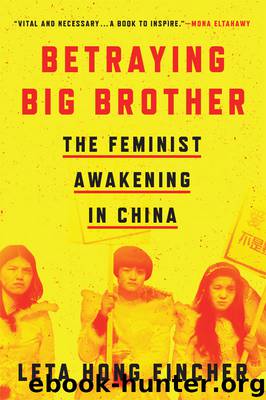Betraying Big Brother by Leta Hong Fincher

Author:Leta Hong Fincher
Language: eng
Format: epub
Publisher: Penguin Random House LLC (Publisher Services)
Following several decades of Communist Party–mandated equal employment for women and men in the planned economy after Mao Zedong’s death in 1976, the government under the new leadership of Deng Xiaoping introduced sweeping economic reforms. Although life had undeniably been harsh and cruel for everyone during the Mao era, gender inequality skyrocketed as China’s postsocialist market reforms took hold.
In 1978, China’s State Council mandated that women in labor-intensive fields must retire at age fifty, while ordinary male workers could retire at sixty—a stunning new form of structural discrimination against women. (White-collar women who are public servants must generally retire at fifty-five, while white-collar men may often work until sixty-five.) Although the government recently announced that it would slowly raise the mandated retirement age, the five-to-ten-year gender gap remains basically in place today.
Urban women’s labor participation dropped precipitously from its high at the end of the 1970s when China began dismantling the planned economy. The massive state-owned enterprises that had provided workers with an “iron rice bowl” of guaranteed life employment began firing tens of millions of workers. Women at state-owned companies were the first to be fired—or told to retire at forty-five—and the last to be rehired later, according to Liu Jieyu. State enterprises also closed childcare centers, hurting the younger women workers who remained employed, since women were—and continue to be—primary caregivers for children and the elderly.
In the late 1980s and 1990s, a “Women Return to the Home” (nüren hui jia) movement gained popularity as unemployment increased, along with calls on women to give up their jobs for men. As free-market reforms deepened, gender discrimination in hiring became rampant; this persists today, with many job ads blatantly stating that they are only seeking to hire men. Or, if the jobs are open to women, they often specify that the women must be married with children, or be of a certain age, height or weight, or look a certain way. (Gender discrimination in hiring is one issue Chinese feminists frequently take on.)
After the Tiananmen massacre of 1989 crushed a massive uprising of pro-democracy protesters and the Soviet Union collapsed, it became even more politically urgent for the government to accelerate market-oriented economic reforms to prop up the Communist Party’s legitimacy. The resulting “economic miracle” of double-digit GDP growth rates in effect co-opted most Chinese citizens, who ceased to demand political reforms as long as their living standards were rising.
In 1995, China hosted the UN World Conference on Women, and the Chinese government agreed to allow the formation of some women’s rights NGOs in exchange for the privilege of being host country, according to veteran women’s rights advocate Feng Yuan. “But behind the rhetoric of openness, there were always tight constraints on our activities,” says Feng, who began her career as a journalist, then joined with other women journalists to set up the NGO Media Monitor for Women Network in 1996.
Until the 1995 UN women’s conference—made famous by Hillary Rodham Clinton’s speech proclaiming that “women’s rights are human rights”—most women in China did not know what domestic violence meant.
Download
This site does not store any files on its server. We only index and link to content provided by other sites. Please contact the content providers to delete copyright contents if any and email us, we'll remove relevant links or contents immediately.
| Arms Control | Diplomacy |
| Security | Trades & Tariffs |
| Treaties | African |
| Asian | Australian & Oceanian |
| Canadian | Caribbean & Latin American |
| European | Middle Eastern |
| Russian & Former Soviet Union |
The Secret History by Donna Tartt(19088)
The Social Justice Warrior Handbook by Lisa De Pasquale(12190)
Thirteen Reasons Why by Jay Asher(8909)
This Is How You Lose Her by Junot Diaz(6886)
Weapons of Math Destruction by Cathy O'Neil(6279)
Zero to One by Peter Thiel(5802)
Beartown by Fredrik Backman(5754)
The Myth of the Strong Leader by Archie Brown(5507)
The Fire Next Time by James Baldwin(5444)
How Democracies Die by Steven Levitsky & Daniel Ziblatt(5218)
Promise Me, Dad by Joe Biden(5153)
Stone's Rules by Roger Stone(5088)
A Higher Loyalty: Truth, Lies, and Leadership by James Comey(4963)
100 Deadly Skills by Clint Emerson(4925)
Rise and Kill First by Ronen Bergman(4788)
Secrecy World by Jake Bernstein(4753)
The David Icke Guide to the Global Conspiracy (and how to end it) by David Icke(4718)
The Farm by Tom Rob Smith(4509)
The Doomsday Machine by Daniel Ellsberg(4490)
